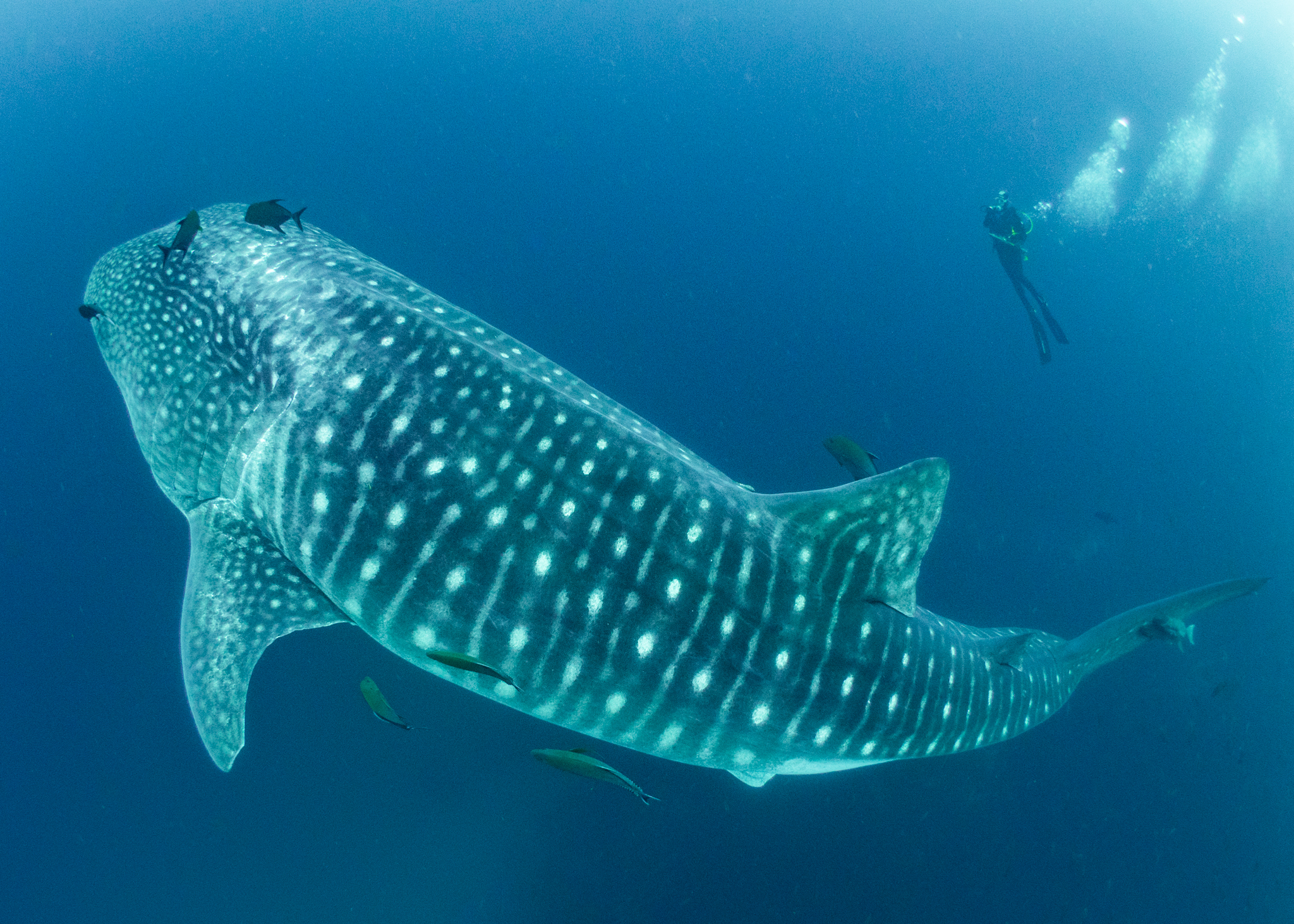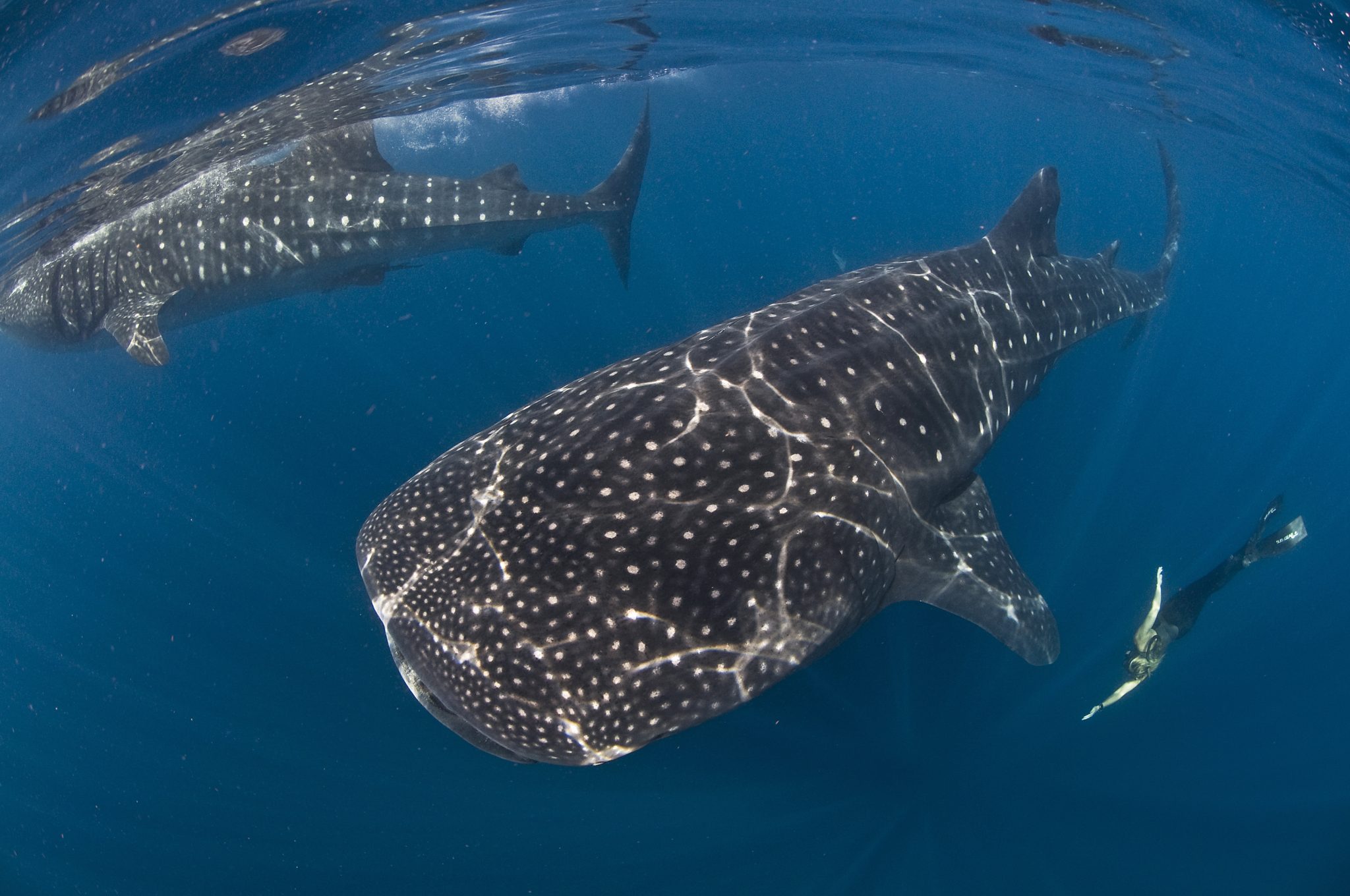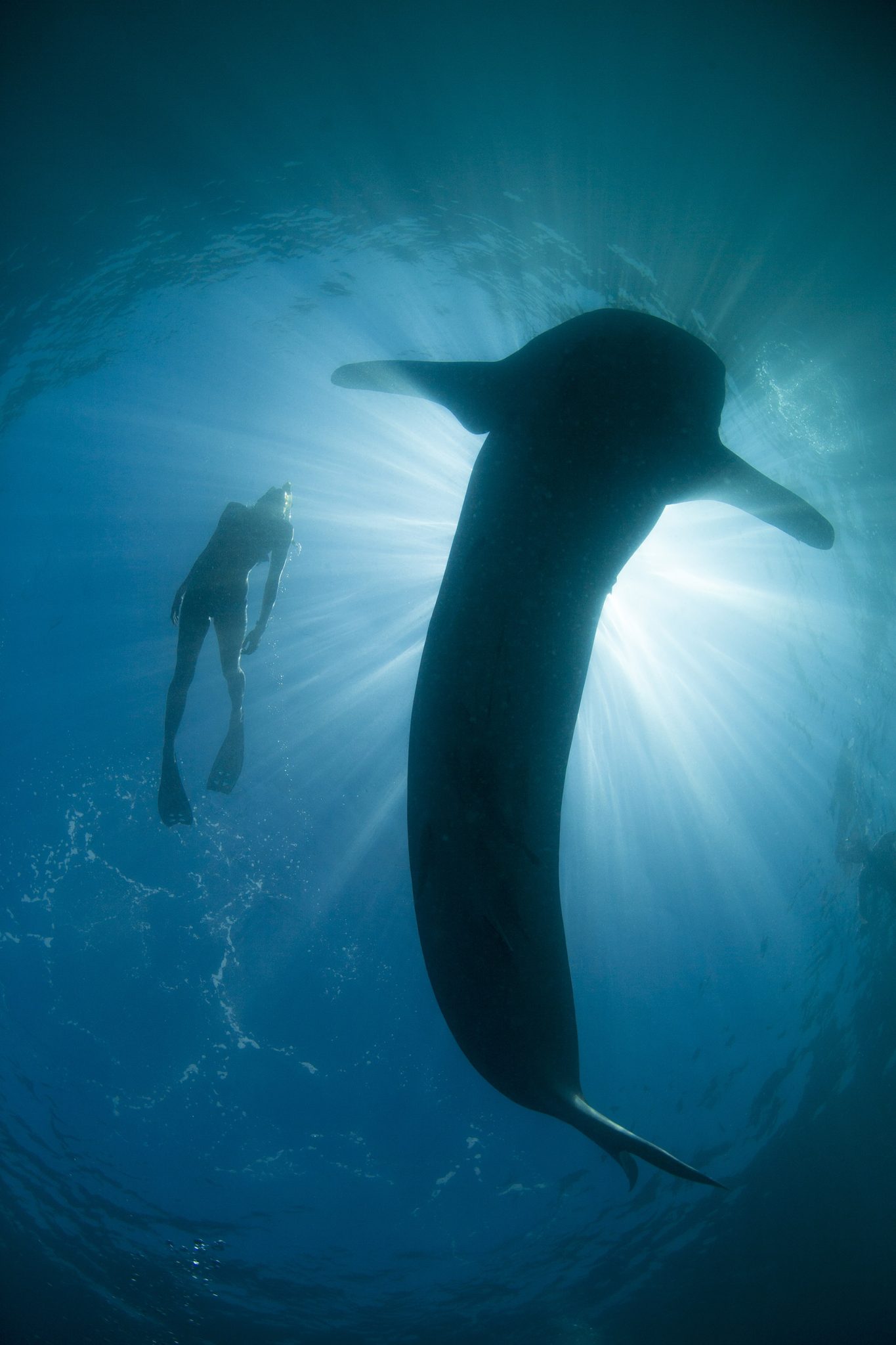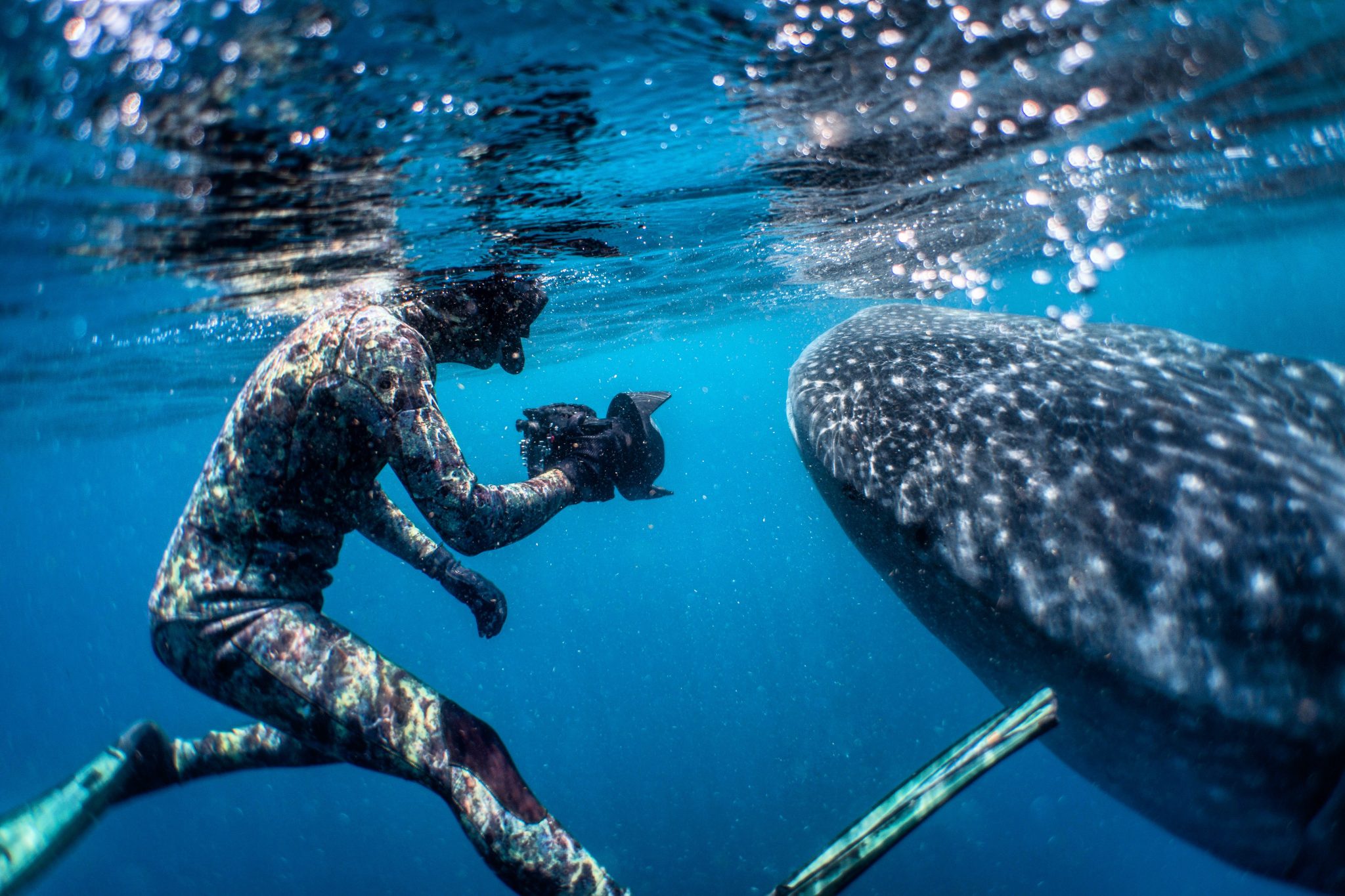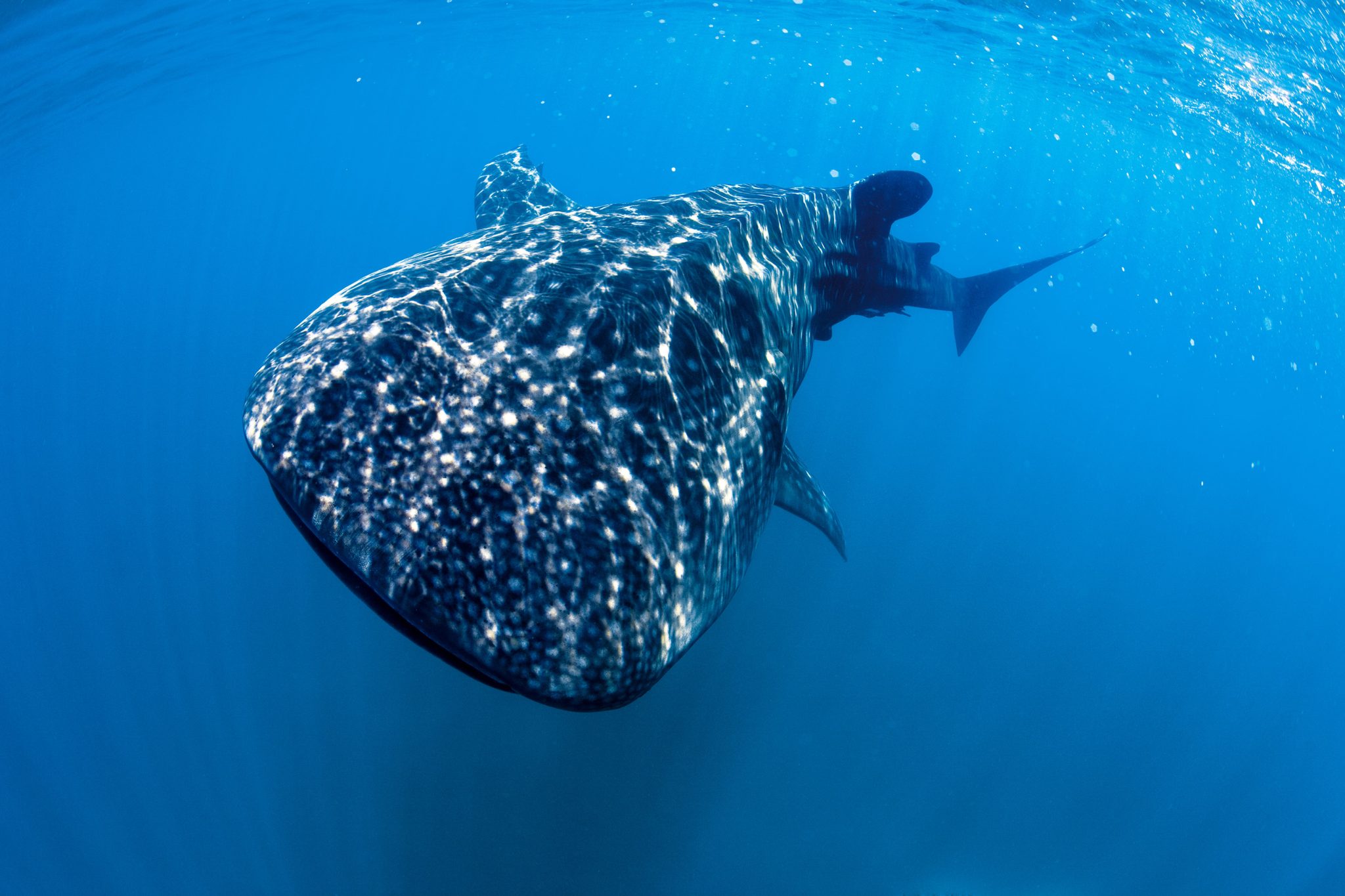Marine Life & Conservation
Celebrating the biggest fish in the sea: International Whale Shark Day 2022
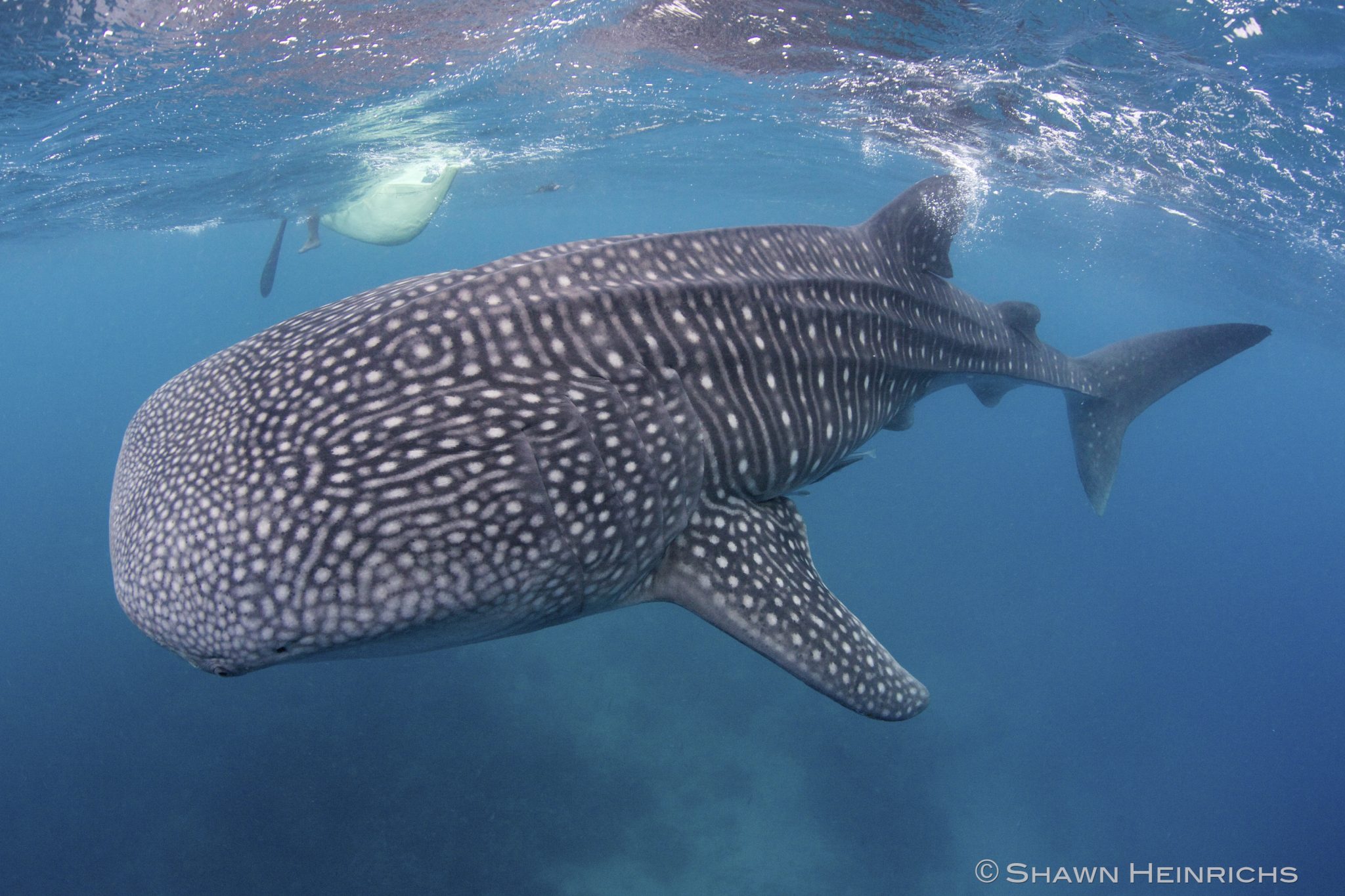
On August 30, the world is showing the biggest shark that lives in our oceans some big, BIG love. Because believe it or not, the biggest fish in the sea needs all the love they can get! Sure they are a shark – but they are the closest thing to a vegetarian that exists in the shark world. Filter feeders, they eat plankton. While their mouths are 4 feet wide, their throats are the size of a quarter. And before you begin to worry about their 3000+ teeth, you should probably know they are only the size of the head of a match.
It’s hard to believe given the fact they can grow up to 40 feet in length and weigh up to 20 tons, but they are very elusive and proficient in the art of underwater camouflage. In fact, Jacques Cousteau only saw three in his lifetime!
They are found in all temperate and tropical oceans around the world except for the Mediterranean Sea, and can migrate thousands of miles between feeding areas. They spend most of their lives near the surface, but have been known to dive to depths of almost 2,000m.
These gentle giants are magical – with a unique dot pattern that is specific to each individual whale shark. Their populations are so low that there is a genetic similarity among all whale sharks worldwide. Whale sharks play an extremely important role keeping the oceans healthy while also creating sustainable income for local communities through tourism. However, like many other shark species, whale sharks are classified as Endangered on the IUCN Red List of Endangered Species, with declining populations worldwide. With massive migratory areas that make them difficult to protect, the fact they are often bycatch or targeted for their meat + fins, and as filter feeders that they often consume micro-plastics, whale sharks need all the help they can get.
Here’s everything you need to know about these incredible fish – including how to meet them, how to protect them, and how to celebrate them every day!
Whale Shark Fun Facts:
- Name: Rhincodon typus
- Size: 18- 40 feet
- Weight: up to 20 tons (equivalent to 3 African Elephants, a full school bus or 12,000+ bricks!)
- Physical features: mouths are 5 feet wide with 3,000 teeth, eyes are as big as golf balls
- Life Span: estimated 60-100 years
- IUCN Red List Status: Endangered
1) Love Tropical Waters Both Deep and Shallow
The preferred environments of whale sharks are tropical and temperate waters and all over the world, including both deep and shallow coastal waters and lagoons of coral atolls.
A marine biologist named Eric Hoffmayer recorded the deepest dive yet: in 2008, he monitored a shark in the Gulf of Mexico that descended 6,324 feet. Sharks lack a swim bladder that keeps other fish buoyant, so one idea is that whale sharks free-fall toward the seafloor to rest.
Whale sharks especially love the Philippines. In 2016, the 1000th whale shark was identified in Philippine waters, making the Philippines the third largest known aggregation of whale sharks in the world and the biggest in South East Asia.
2) Endurance Swimmers Who Are Global Travelers
Whale sharks are one of the most migratory species and can travel around 40 miles per day! They tend to prefer different geographic locations at various times of year based largely on water temperature, food supplies and breeding opportunities. Genetic studies show that whale sharks across the globe are closely related which suggests that mating is one of the reasons for such long travels.
It is believed that pregnant females will migrate long distances to be able to give birth near remote islands where baby sharks will be out of reach of common predators.
But they are also slow swimmers (for sharks) usually moving at no more than 3 mph. Their swimming pattern is different than most sharks in that instead of using just the caudal fin for primary propulsion, they use the full posterior two-thirds of their body length.
The record for whale shark migration was 12,000 miles by a whale shark named Anne in 2011. She was tracked making the mammoth migration from near Panama in the southeastern Pacific, to an area close to the Philippines in the Indo-Pacific. Other tracked whale sharks have traveled:
- Over 8,000 miles from the Gulf of CA, Mexico to Tonga
- 3,107 miles to the coast of Thailand
3) They Enjoy Alone Time
Whale sharks are usually solitary creatures but come together for months in large aggregations to feed in plankton-dense waters. After feeding, they drift off in random directions, completely disappearing during winter and spring.
4) They Practice Vegetarianism
Whale sharks can eat plankton up to 45 pounds of plankton each day (which is equivalent to 121 cheeseburgers per day). But they also eat shrimp, sardines, anchovies, mackerels, squid, tuna, and albacore. and fish eggs. According to The Nature Conservatory, whale sharks will wait as long as 14 hours for fish to spawn on reefs and then they will swoop in and eat the eggs.
But they also largely have a vegetarian diet, especially when other prey is scarce. Scientists discovered that whale sharks get more than half their nutrients from plants and algae.
5) Each Baby Whale Shark is a Miracle!
Whale sharks are ovoviviparous, meaning they produce eggs that hatch inside the mother’s uterus. Litters can be up to 300 pups but not all pups are birthed at the same time. That is almost twice as many as any other shark species.
But only one pregnant whale shark has ever been studied and, interestingly, many of these embryos were at different stages of development. Scientists observed that some were still in their egg cases whilst others had emerged but were still in the uterus. This may signify that females are able to store a male’s sperm, selectively fertilizing their eggs over a prolonged period.
Juvenile whale sharks, as docile and vulnerable as their elders, often become prey for other sharks and orcas, so while a female may birth more than 300 pups at a time, survival rates are devastatingly low; females giving birth to multiple litters at different times could increase their survival rate which could be why they have their very own, built-in sperm banks.
Making the birth of a whale shark even more miraculous is the fact that each whale shark’s pattern is as unique as a human fingerprint!
Think You Know Whale Sharks? Click here for a fun way to test your whale shark IQ!
Header Photo: Whale shark in Oslob by Shawn Heinrichs
Marine Life & Conservation
Double Bubble for Basking Sharks

 The Shark Trust is excited to announce that, for two more days only, all donations, large or small, will be doubled in the Big Give Green Match Fund!
The Shark Trust is excited to announce that, for two more days only, all donations, large or small, will be doubled in the Big Give Green Match Fund!
Donate to Basking in Nature: Sighting Giants
The Shark Trust is hoping to raise £10k which will be doubled to £20k. This will go towards Basking in Nature: Sighting Giants. And they need YOUR help to reach they’re goal.
The Shark Trust’s citizen science project is to monitor and assess basking sharks through sightings; encouraging data collection, community engagement, and promoting nature accessibility. This initiative aims to enhance health and wellbeing by fostering a deeper connection with British Sharks.
Campaign Aims
- Increase citizen science reporting of Basking Sharks and other shark sightings to help inform shark and ray conservation.
- Provide educational talks about the diverse range of sharks and rays in British waters and accessible identification guides!
- Create engaging and fun information panels on how to ID the amazing sharks and rays we have on our doorstep! These can be used on coastal paths around the Southwest. With activities and information on how you can make a difference for sharks and rays!
- Promote mental wellbeing through increasing time in nature and discovering the wonders beneath the waves!
Donate, and double your impact. Click Here
Marine Life & Conservation
Leading UK-based shark conservation charity, the Shark Trust, is delighted to announce tour operator Diverse Travel as a Corporate Patron

 Corporate Patrons provide a valuable boost to the work of The Shark Trust. The Trust team works globally to safeguard the future of sharks, and their close cousins, the skates and rays, engaging with a global network of scientists, policymakers, conservation professionals, businesses and supporters to further shark conservation.
Corporate Patrons provide a valuable boost to the work of The Shark Trust. The Trust team works globally to safeguard the future of sharks, and their close cousins, the skates and rays, engaging with a global network of scientists, policymakers, conservation professionals, businesses and supporters to further shark conservation.
Specialist tour operator Diverse Travel has operated since 2014 and is committed to offering its guests high quality, sustainable scuba diving holidays worldwide. Working together with the Shark Trust will enable both organisations to widen engagement and encourage divers and snorkellers to actively get involved in shark conservation.
“Sharks are truly at the heart of every diver and at Diverse Travel, we absolutely share that passion. There is nothing like seeing a shark in the wild – it’s a moment that stays with you forever!” says Holly Bredin, Sales & Marketing Manager, Diverse Travel.
“We’re delighted to celebrate our 10th year of business by becoming a Corporate Patron of the Shark Trust. This is an exciting partnership for Diverse and our guests. We will be donating on behalf of every person who books a holiday with us to contribute towards their vital shark conservation initiatives around the world. We will also be working together with the Trust to inspire divers, snorkellers and other travellers to take an active role – at home and abroad – in citizen science projects and other activities.”
Paul Cox, CEO of The Shark Trust, said:
“It’s an exciting partnership and we’re thrilled to be working with Diverse Travel to enable more divers and travellers to get involved with sharks and shark conservation. Sharks face considerable conservation challenges but, through collaboration and collective action, we can secure a brighter future for sharks and their ocean home. This new partnership takes us one more valuable step towards that goal.”
For more information about the Shark Trust visit their website here.
For more about Diverse Travel click here.
-

 News3 months ago
News3 months agoHone your underwater photography skills with Alphamarine Photography at Red Sea Diving Safari in March
-

 News3 months ago
News3 months agoCapturing Critters in Lembeh Underwater Photography Workshop 2024: Event Roundup
-

 Marine Life & Conservation Blogs3 months ago
Marine Life & Conservation Blogs3 months agoCreature Feature: Swell Sharks
-

 Blogs2 months ago
Blogs2 months agoMurex Resorts: Passport to Paradise!
-

 Blogs2 months ago
Blogs2 months agoDiver Discovering Whale Skeletons Beneath Ice Judged World’s Best Underwater Photograph
-

 Gear Reviews2 weeks ago
Gear Reviews2 weeks agoGEAR REVIEW – Revolutionising Diving Comfort: The Sharkskin T2 Chillproof Suit
-

 Marine Life & Conservation2 months ago
Marine Life & Conservation2 months agoSave the Manatee Club launches brand new webcams at Silver Springs State Park, Florida
-

 Gear Reviews3 months ago
Gear Reviews3 months agoGear Review: Oceanic+ Dive Housing for iPhone


